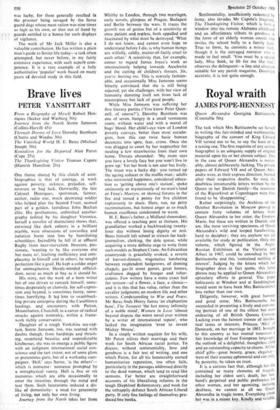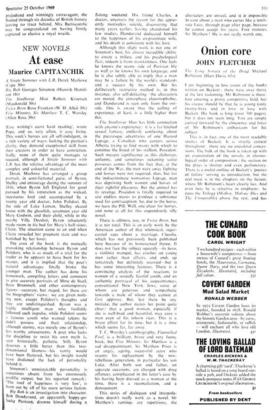Royal wraith
JAMES POPE-HENNESSY
Queen Alexandra Georgina Battiscombe (Constable 50s)
The task which Mrs Battiscombe set herself in writing this fair-minded and workmanlike biography of the consort of King Edward VII turned out to be, to say the least of it, a testing one. The first requisite of any serious biographer is an adequate supply of original material upon his or her chosen subject. This in the case of Queen Alexandra is notice- ably, almost deliberately, lacking. The private papers of Edward VII and of Queen Alex- andra were, at their express direction, burned after their respective deaths. So were the doubtless innumerable letters written by the Queen to her Danish family—the resources of the Rigsarkivet at Capenhagen were thus found to be 'disappointing'.
Rather surprisingly, the Archives of the October Revolution in Moscow proved to contain forty volumes of letters from Queen Alexandra to her sister, the Empress Marie, but these are written in Danish, and are, like most surviving specimens of Queen Alexandra's wild and looped handwriting. hard to decipher ; they are anyhow not yet available for study or publication. Only one volume, which figured in the Anglo- Russian Exhibition at the Victoria and Albert in 1967, could be consulted by Mrs Battiscombe and this 'contained nothing of interest'. Judging by the letters which her biographer does in fact quote, this latter phrase may be applied to Queen Alexandra's epistolary efforts in general. The paper holocausts at Windsor and at Sandringham would seem to have been Mrs Battiscombe's loss rather than our own.
Diligently, however, with great humour
and good sense, Mrs Battiscombe has succeeded in presenting a lively and convinc- inettortrait of one of the silliest but most endearing of all British Queens Consort. Lacking even the faintest tremor of intellec- tual tastes or interests, Princess 'Alex of Denmark, on her marriage in 1863, brought to this country as her mental trousseau a fair knowledge of four European languages. the outlook of a delightful, thoughtless child and an outstanding capacity to charm. All her chier gifts—great beauty, grace, elegance were of their essence ephemeral and can only, by posterity, be taken on trust. It is a curious fact that, although her life contained so many elements of tragedy.
including her eldest son's death, her hus- band's perpetual and public preference for other women, and her agonising, isolating deafness, we cannot at all see Queen Alexandra in tragic terms. Everything about her was in kminor key. Kindly and voluble,
prejudiced and winningly extravagant, she floated through six decades of British history leaving no trace behind. Mrs Battiscombe may be congratulated on having firmly captured so elusive a royal wraith.



















































 Previous page
Previous page